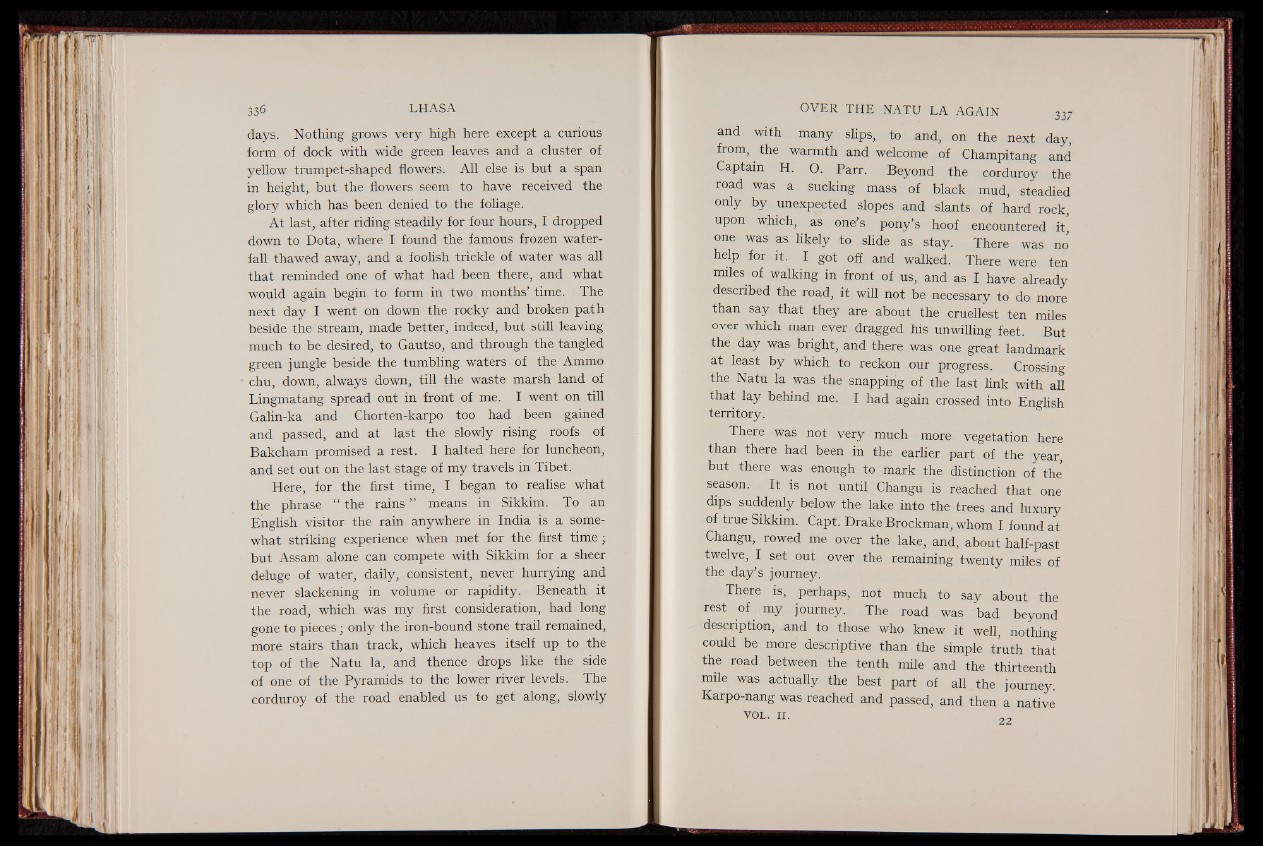
days. Nothing grows very high here except a curious
form of dock with wide green leaves and a cluster of
yellow trumpet-shaped flowers. All else is but a span
in height, but the flowers seem to have received the
glory which has been denied to the foliage.
At last, after riding steadily for four hours, I dropped
down to Dota, where I found the famous frozen waterfall
thawed away, and a foolish trickle of water was all
that reminded one of what had been there, and what
would again begin to form in two months’ time. The
next day I went on down the rocky and broken path
beside the stream, made better, indeed, but still leaving
much to be desired, to Gautso, and through the tangled
green jungle beside the tumbling waters of the Ammo
chu, down, always down, till the waste marsh land of
Lingmatang spread out in front of me. I went on till
Galin-ka and Chorten-karpo too had been gained
and passed, and at last the slowly rising roofs of
Bakcham promised a rest. I halted here for luncheon,
and set out on the last stage of my travels in Tibet.
Here, for the first time, I began to realise what
the phrase “ the rains ” means in Sikkim. To an
English visitor the rain anywhere in India is a somewhat
striking experience when met for the first time ;
but Assam alone can compete with Sikkim for a sheer
deluge of water, daily, consistent, never hurrying and
never slackening in volume or rapidity. Beneath it
the road, which was my first consideration, had long
gone to pieces; only the iron-bound stone trail remained,
more stairs than track, which heaves itself up to the
top of the Natu la, and thence drops like the side
of one of the Pyramids to the lower river levels. The
corduroy of the road enabled us to get along, slowly
and with many slips, to and, on the next day,
from, the warmth and welcome of Champitang and
Captain H. O. Parr. Beyond the corduroy the
road was a sucking mass of black mud, steadied
only by unexpected slopes and slants of hard rock,
upon which, as one’s pony’s hoof encountered it,
one was as likely to slide as stay. There was no
help for it. I got off and walked. There were ten
miles of walking in front of us, and as I have already
described the road, it will not be necessary to do more
than say that they are about the cruellest ten miles
over which man ever dragged his unwilling feet. But
the day was bright, and there was one great landmark
at least by which to reckon our progress. Crossing
the Natu la was the snapping of the last link with all
that lay behind me. I had again crossed into English
territory.
There was not very much more vegetation here
than there had been in the earlier part of the year,
but there was enough to mark the distinction of the
season. It is not until Changu is reached that one
dips suddenly below the lake into the trees and luxury
of true Sikkim. Capt. Drake Brockman, whom I found at
Changu, rowed me over the lake, and, about half-past
twelve, I set out over the remaining twenty miles of
the day’s journey.
There is, perhaps, not much to say about the
rest of my journey, The road was bad beyond
description, and to those who knew it well, nothing
could be more descriptive than the simple truth that
the road between the tenth mile and the thirteenth
mile was actually the best part of all the journey.
Karpo-nang was reached and passed, and then a native
v o l . m 2 2